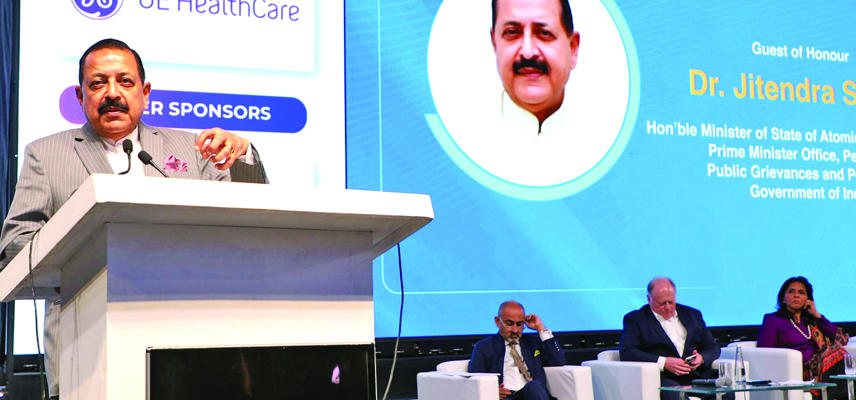
STATE TIMES NEWS
NEW DELHI: Union Minister Dr Jitendra Singh, who is also an eminent Professor of Medicine and Diabetes, has advocated what he describes as “Indian regimens for Indian patients” with optimum AI (Artificial Intelligence) intervention.

“Indian solutions for Indian problems, Indian patient data for Indian medical research and Indian regimens for Indian conditions coupled with responsible AI intervention,”-this was the powerful message delivered by Union Minister Dr. Jitendra Singh at the “International Health Dialogue” organised by the Apollo Corporate Group at Bharat Mandapam in the capital today. Highlighting India’s emergence as a global healthcare leader, he underscored the country’s innovative strides in preventive healthcare, medical research, and technology-driven solutions.
A key highlight of Dr. Jitendra Singh’s address was the role of artificial intelligence (AI) in transforming healthcare delivery. He emphasized the need for responsible AI intervention, stating, “One has to be intelligent enough to use artificial intelligence; otherwise, we risk becoming artificial ourselves.” He pointed out that AI is already revolutionizing diagnostics, patient monitoring, and healthcare accessibility, particularly in rural areas where access to specialists is limited. He cited the success of an AI-driven mobile clinic initiative in his constituency, where AI-assisted consultations are paired with real-time doctor interventions. “We have developed a hybrid model where AI is not replacing doctors but assisting them in reaching patients in remote locations, enabling real-time diagnosis and immediate specialist consultation. Within 40-50 minutes, a patient can receive a prescription from a qualified specialist through AI-facilitated telemedicine,” he explained. Dr. Jitendra Singh also addressed concerns about over-reliance on AI, stressing that human oversight remains critical. He recalled an AI-driven public grievance redressal initiative where a human intervention desk had to be set up to ensure empathetic responses. “Technology must serve as an enabler, not a substitute for human judgment,” he said. Discussing India’s unique healthcare challenges, Dr. Jitendra Singh pointed out that the country faces a dual burden of communicable and non-communicable diseases, with lifestyle disorders like diabetes now affecting younger populations. He warned that while India is known as a young country, it also has a rising number of elderly citizens, requiring a multi-pronged healthcare approach.
The Minister also shed light on India’s innovations in public health management, particularly in sanitation. He shared how nuclear technology is being used to manage sewage disposal at the Kumbh Mela, ensuring hygiene for millions of pilgrims. “Managing the waste of 50-60 crore people is an opportunity to develop a technology unique to India, and we have done just that,” he asserted.
Dr. Jitendra Singh praised India’s rapid advancements in healthcare under the leadership of Prime Minister Narendra Modi, citing the success of Ayushman Bharat as a game-changing initiative in global health insurance. “It is perhaps the only scheme in the world that insures even pre-existing diseases, making healthcare truly inclusive and accessible,” he said. With over 1.5 lakh wellness centers in the pipeline and a dedicated Ministry of Ayush, India has positioned itself as a hub of integrated healthcare, seamlessly blending traditional knowledge with modern medicine.
Dr. Jitendra Singh also underscored India’s leadership in vaccine development, recalling the country’s pioneering role in producing the first DNA vaccine for COVID-19 and the development of the HPV vaccine for cervical cancer prevention. He noted that India is emerging as a key player in biomanufacturing, ranking third in the Asia-Pacific region and among the top twelve globally. “We are moving in the right direction with a quantum leap in medical research and biotech-driven economic growth,” he remarked.
The Minister emphasized India’s leadership in biotechnology, noting that the country has grown from just 50 biotech startups before 2014 to over 9,000 today, driving a bioeconomy worth over $130 billion. He also announced the recent development of India’s first indigenous antibiotic, Naphthomycin, and the successful completion of gene therapy trials for hemophilia, a breakthrough published in the prestigious New England Journal of Medicine. Concluding his speech, Dr. Jitendra Singh reaffirmed the government’s commitment to making India a global health leader through robust preventive healthcare, indigenous medical innovations, and cutting-edge technology. “To achieve Viksit Bharat, we must ensure a Swasth Bharat,” he declared, acknowledging the crucial role of institutions like the Apollo Group in driving India’s healthcare revolution. The 12th International Health Dialogue was organized by Apollo Hospitals and brought together leading healthcare experts, policymakers, and industry leaders from across the globe. The event focused on advancements in AI-driven healthcare, biotechnology, and digital health solutions. Several panel discussions highlighted the role of AI in improving diagnostics, reducing costs, and making quality healthcare more accessible, particularly in developing nations like India.

